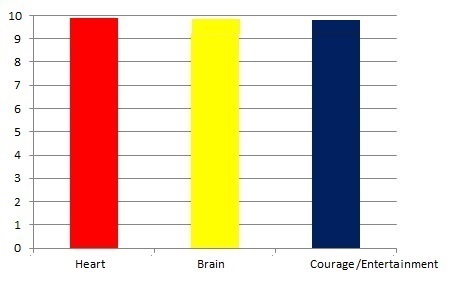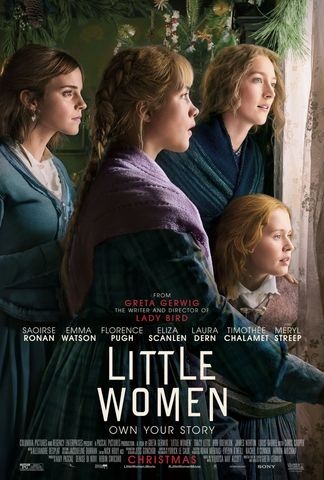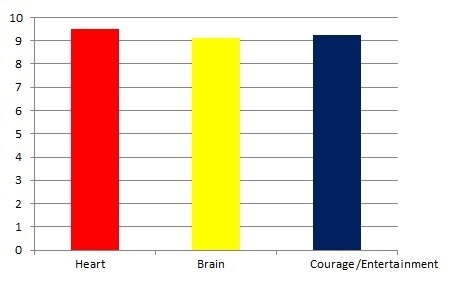
Main Page
Alphabetical Menu
Chronological Menu
|
1917  During World War I, General Erinmore (Colin Firth) sends British soldiers Blake (Dean-Charles Chapman) and Schofield (George MacKay) on a mission to deliver a message to Colonel Mackenzie (Benedict Cumberbatch) ordering his brigade to stop attacking the German army. They must travel nine miles through the treacherous terrain of enemy territory to reach Colonel Mackenzie's brigade and to deliver the message which would save the lives of 1,600 soldiers. Writer/director Sam Mendes and co-writer Krysty Wilson-Cairns immerse the audience in the lives of Blake and Schofield from the very first frame as they're laying on the grass under a tree together. One minute later, you learn what mission they're going to go on and why they need to go on it. That crucial scene never feels like exposition because the screenwriters keep it brief, clear and concise. Although the soldiers have one task that sounds simple and straightforward, their journey itself is filled with complexity. Both Blake and Schofield come across as human beings thanks to both the natural dialogue and the emotionally resonant performances that open a window into both of their heart, mind and soul. There's no use of a narrator or a wrap-around story like in Saving Private Ryan. Even without flashbacks or long expository monologues, you still learn just enough about the characters to get to know them and to be emotionally invested in their lives. Less is more, after all, so bravo to the filmmakers for incorporating subtlety and nuance so organically without boring the audience. The cinematography by Roger Deakins and the musical score by Thomas Newman help to enrich the film while immersing the audience even further. The camera follows Blake and Schofield in one shot from start to finish, a bold choice that pays off in more ways than one by the time the end credits role. You hear what the soldiers hear and see what they see. There are no "bird's eye view" shots to be found here. The cinematography, the landscape, set design, lighting, sound editing and musical score combine to provide an atmosphere along with a kind of poetry that must be experienced on the big screen. The landscape that the soldiers go through often looks like the post-apocalypse or like Dante's Inferno. Some of the poetic scenes are indeed hard to watch because they unflinchingly show the ugly side of war, but that makes them all the more haunting. George MacKay and Dean-Charles Chapman both give natural and moving performances. They have great chemistry together, and it's captivating to watch Blake and Schofield develop a rapport as they walk together. They joke around at times, share their feelings and show compassion throughout their mission. Although 1917 does have a plot with some action scenes, it's much more about the two soldier's emotional journey. They each have their own unique personality which makes them all the more human and relatable, even for those audience members who've never been through a war. Mendes and Wilson-Cairns deserve to be commended for including witty lines like when Schofield to Blake, "Age before beauty" as they climb up a trench. They clearly trust audience's intelligence, emotions, imagination and patience. Moreover, they wisely include small moments of comic relief which provides much-needed levity. The fact that they accomplish all of that in under 2 hours is a feat unto itself. At a running time of 110 minutes, 1917 is one of the most exhilarating, audacious and powerful war films in years. It ranks up there with classic war films like All Quiet on the Western Front, Apocalypse Now and Saving Private Ryan.  Little Women  The four March sisters, Meg (Emma Watson), Jo (Saoirse Ronan), Beth (Eliza Scanlen), and Amy (Florence Pugh), struggle with love, art and indepedence while living with their mother, Marmee (Laura Dern). Theodore “Laurie” Laurence (Timothée Chalamet), the son of a wealthy man, Mr. Laurence (Chris Cooper), flirts with the sisters as each of them has feelings for him. The screenplay by writer/director Greta Gerwig is a refreshing update of the classic story based on the titular novel by Louisa May Alcott. Gerwig jumps back and forth with the present day when Jo goes to the office of a book publisher, Mr. Dashwood (Tracey Letts), to submit her book about her and her siblings. The film then flashes back to the younger days of the March sisters while introducing you to each sister who has her own unique personality, dreams and innate struggles. There are some jumps forward to their adulthood, but they're done smoothly without taking away from the narrative momentum. A less sensitively written screenplay would've been an incoherent mess with such a structure, so that's a testament to Gerwig's talents as a screenwriter because it means that she knows how to tell a story effectively. The dialogue brims with wit and kernels of wisdom, and there's not a single line that sounds too preachy, corny or stilted. Moreover, there's just the right amount of comic relief that provides levity to the romance and drama. One of Little Women's many strengths is that it treats its characters like human beings from beginning to end. The four sisters feel like sisters and act like sisters when they get along or, in some cases, when they don't. They're each fully-fleshed characters which is partially thanks to the well-written screenplay that designs a window into their heart, mind and souls, but mostly thanks to the talented actresses who embody those characters so convincingly while opening that large window. All audiences, not just women, might find themselves relating to at least one of the March sisters and, most importantly, caring about whether or not they find love and happiness. When it comes to the performances, it's hard to pick just one that stands out because they're all part of an acting ensemble and each of them gets a chance to shine brightly, but the ones who give the most radiant performances are Saoirse Ronan and Florence Pugh. They're very well-cast and disappear into their roles. On top of that, the costume design and set design look exquisite while further enhancing the film's authenticity. At a running time of 2 hours and 15 minutes, which feels more like 90 minutes, Little Women is an engrossing romantic drama brimming with wit, warmth and marvelous performances.  Main Page Alphabetical Menu Chronological Menu ______________________________________________________ |
The NYC Movie Guru
themovieguru101@yahoo.com
Privacy Policy